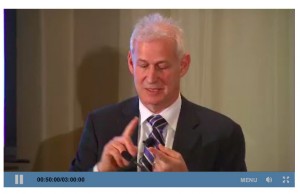 “We’re living in the midst of a revolution in neuroscience, molecular biology and genomics,” said Dr. Jack Shonkoff, chairman of the National Scientific Council on the Developing Child, at Tuesday’s “Breakthrough Research on Building Better Brains” presentation in Atlanta.
“We’re living in the midst of a revolution in neuroscience, molecular biology and genomics,” said Dr. Jack Shonkoff, chairman of the National Scientific Council on the Developing Child, at Tuesday’s “Breakthrough Research on Building Better Brains” presentation in Atlanta.
The lecture, sponsored by the Arthur M. Blank Family Foundation Speaker Series and the national nonprofit research center Child Trends, focused on the influence of “toxic stress” on the development of children, which Dr. Shonkoff called both a major psychological and physiological detriment to youngsters.
He began the presentation by speaking about the “plasticity” of brains for young children, which he said is firmly influenced by early childhood experiences.
“Early life experiences are built into our bodies, for better or for worse,” Dr. Shonkoff said. “Things that happen early in life are creating physiological changes later on.”
He said children that experience a lack of response from adults, primarily parental figures, in their formative “birth-to-5” years are much likelier to suffer from “toxic stress,” which he said may potentially weaken neuroconnectors in the brain.
Dr. Shonkoff said that “toxic stress,” which he defined as “prolonged activation of stress response systems in the absence of protective relationships,” generally increases the likelihood of individuals developing depression, substance abuse issues and even cardiovascular disease later in life.
“The pileup of adversity affects the brain,” he said.
He criticized what he considered the “fragmentation” of health, education, economic development and human services, stating that he was a proponent of a more comprehensive model. “An integrated science of early childhood development,” he said, “could drive more productive investments across sectors.”
He said that parenting education, sound nutrition, stimulating experiences, and health-promoting environments were vital to modern “developmental trajectories”, stating that those that ignore such issues are doing so at their own peril. Dr. Shonkoff, a pediatrician by trade, said that when adversity levels overwhelm the capacity of programs to counteract toxic stress, children are much likelier to experience impaired health and development.
“All of us have a huge investment in improving outcomes,” he said. “It’s a compelling moral imperative.”
Dr. Shonkoff said that in the United States, early childhood policies and programs are often relegated to education issues.
“But it’s only half the story,” he said. He added that the “same roots of disruption” found in early childhood education can also be linked to health issues. The matter of childhood development, he said, is as “much about disease prevention” as it is schooling.
“An integrated science-based logic model could inform more effective early childhood policies and programs,” he said. “Science has more to offer now than politics and ideology”
He said that “new approaches” to strengthen parent and service provider capabilities are needed to combat the effects of toxic stress, especially regarding parents with limited education and income.
Dr. Shonkoff said that differences in the pre-frontal cortex development in children of varying social classes can be apparent as early as infancy. “What’s missing isn’t information, but skills building,” he said. He then referred to the key neurological development periods of early childhood and adolescence as “windows of opportunity we really ought to be grabbing.”
He said that, typically, the difference between healthy development and poor development in children was a matter of “biological adaptation or disruption” in the form of “supportive, stable relationships,” which he said was the most important aspect in determining the environmental “toxic stress” levels in the lives of young children.
“The goal is around the relationships children have with the important people in their lives,” he said. This is especially significant regarding parents in need of economic support, he noted.
“We can improve outcomes for children,” Dr. Shonkoff said, “[but] we have yet to show that we can eliminate the disparities.”
